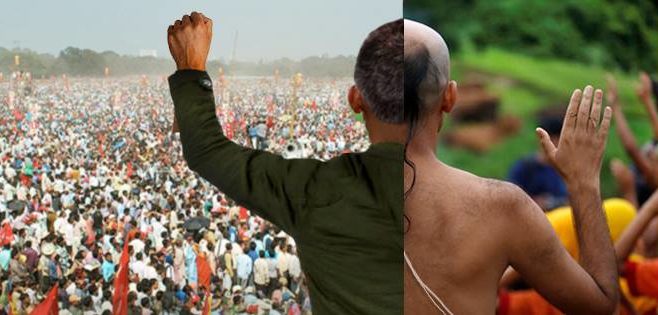
Brahmin-Bania Hegemony in Journalism
Journalism is the first intellectual domain. The journalists have contributed to the society through honest investigative reporting. Brahmanism is hand in glove in India and they create hegemony in journalism.
Journalism, over a period of time in India, has become a business headed by the capitalist class and hence, the journalists are not necessarily truth-seekers but very harmless reporters and column writers.
There is the nexus of the ruling class and journalist. The rag-tag world of Indian journalism comprises tired, sick columnists who spin out their gutter journalism to entertain the reading public. These journalists do not enlighten the readers.
As bum-lickers of the ruling class, they enjoy the good life and hence move heaven and earth to maintain the status quo. No original thinking, no refreshing thought. They dare not speak out the truth. Rather, they amend the truth.
In a country, where a circle of oppression is created with the help of ruling class and media, the investigative spirit in journalism perishes and journalism is reduced to gossip writing. The survival of political parties and the press depends largely on the circle of oppression that regularly conspires against the exploited class.

Each journalist has become the tail of some political leader or political party and his secret of survival is not the popularity of his column and its appeal to public conscience but the publicity he derives out of the publication of his yellow garbage.
Racketeers in TV and print media parading as journalists are hand –in –glove with the rulers and the publicity they get to keep alive. It is an all-around conspiracy in India to undercut the truth and continue the exploitative game.
Credibility is the oxygen of the Press.
It can be maintained only if newspapers are seen to be as anxious to expose those among them guilty of misusing their powers as they are to expose misuse of political and bureaucratic authority. Journalism in India is a ‘collective conspiracy’ that marks the failure of the journalist as intellectual.
We observe that the journalist in India cannot be treated as true intellectual as they are a part and parcel of upper-class hegemony. That brings us to the role of journalists. It is by default that they have come to be treated as intellectuals.
As an overwhelming number of newsmen employed in the print media are unequipped to take any intellectual enterprise and they are not even apologetic about it.
It is only a tiny minority that seems to have succeeded in usurping the role of the intelligentsia, largely because they have access to an effective forum that contrasts sharply with the timorousness of the state-run T.V. and radio.
Language, like media, can be an important tool in the hands of the intellectual class. However, in India, English is considered as a status symbol though English maintains its monopoly over media and other cultural expressions. A microscopic minority of English speaking Indians has given the status of national newspapers for English newspapers. This language bias of the ruling class and exposes the English language – nationalism paradox.
We observed that in post-colonial India, English is considered as a colonial burden on one hand and the English newspapers are elevated to the national status. The English language is considered the symbol of status and prestige is deliberately denied to the masses.
Only English dailies are called ‘national’ newspapers but learning English is dubbed ‘anti-national’.
How do you like it? But India’s English-educated intellectuals are silent on this hypocrisy as the ruling class has put a bar on English education. Such is the depth of dishonesty of our intellectuals.
Author – Dr. Grishma Manikrao Khobragade



Well, learning English is anti-National because once you learn English you ain’t just Learning English you are also learning the values that language has to offer.After learning English, a person is suddenly inclined to know about how they live what’s like to be in US or UK or Australia and after that, you realize the equality with which they live, the laws which are for everyone in the country. You ain’t just learning English, you are also learning the values and morals.
And bhikhaari Brahmins, Rajpoot and Baniya and can’t digest this.
Well said.
Education in any case forms the darkest chapter of history of India, though hardly suspected, much less apprehended.
Every Hindu, eulogized as educationist from Vidyasagar to Radhakrishnan, did not encourage education of the masses. Their reputation as educatinosts as also patron of learning was built on what they did for upper castes as against the lower castes.
West Bengal chief minister Jyoti Basu abolished English education in school from 1982. But he used to address the people of the state over All-India Radio on ceremonial occasion only in English. Such was his level hypocrisy!
His policy created generations of unemployable youths in West Bengal for national employment market.
Basu was a true Stalinist replica in a tiny Bengali frame!
I am totally agree with tactful alience of Baniya and Brahmin. It is fact of Indian Politics & Business. The Politics of Indian democracy is ill, and the political agenda can not struck upon business. Because the political Leaderss are adopted unspected sons by Business Authority.
I totally agree with every word Dr. Grishma Khobrgade has written and diagnosed the issue correctly like a good doctor but then what is the remedy. What is the counter punch?
Superb!!! We feel enlightened .. Rgrds